#SVU meta
Explore tagged Tumblr posts
Text
Honestly,
I like Elliot Stabler, in his various forms. I like his development arc, (I do dislike him abandoning Olivia for a while but this was largely Chris Meloni's fault), I like his troubled relationship with Olivia. I am partly a Bensler shipper, too...
What I feel towards Rafael Barba and Barson and why I'd love them coming together despite Elliot, is huge sympathy to Rafael himself and his quiet, nuanced and thoroughly felt yet not possessive love and admiration of Olivia. He is not dramatic, not possessive, he is a good friend (even though he makes the mistake of getting entangled in this love-not-love triangle with her and Elliot), and he has deep feelings of various kinds for her. And you can see in the right moments how he chooses to express them, and the sadness of them being largely unfulfilled, at least in the present (Season 23). And Olivia, to the shame of it, is too troubled and confused with all things Stabler to pay attention or appreciate this love. :(
#rafael barba#law and order: svu#law and order special victims unit#olivia benson#barson#bensler#elliot stabler#svu meta
39 notes
·
View notes
Text
Rewatching Swing yet again and struck once more by what an absolute gem of an episode it is. I haven’t seen an episode that loves Elliot this much until I watched OC. I really think the writers for season four watched this episode too before writing that season.
It’s foreshadowed in little pieces over the course of the season and the previous one and there’s so many amazing performances in it. Chris Meloni and Ellen Burstyn are of course the stars but Allison Siko gets to shine this episode too.
The writing is amazing:
“I just needed you to know…that I tried to be a good mother”
“Maybe god remembered how cute you were as a carrot”
“I’m through the looking glass here, Liv”
“I can see why you scare the pants off of Kathy”
“It was kids stuff!” “It was your passion! Where did it go?!”
“Like someone had reached inside of me and scooped out my soul”
“Remember how he laughed at you? Because that was only the millionth time he’d heard that from you”
“You pay a pretty steep price” “Maybe I do but it’s my life.”
“Grandma do you think I’m crazy?” “Do you feel crazy?”
“That’s the price we pay for greatness honey”
“If he hated you he’d just walk right out of your life”
“But I was chasing snowflakes”
“That’s because he’s erased his childhood”
“Bottling it up inside hasn’t worked for you. And neither has beating up perps, or walls, or garbage cans. Kathleen may be sick but you’re the one with the problem”
“They just wanted sex. And I gave it to them. A lot of them. Even ones I didn’t know. When I think about it, it makes me wanna die.”
“But you can always start fresh tomorrow” “How?” “By hugging the ones who love you even when you think they might not want it.”
“I’ve lived the life I wanted to live. And I’ve paid a terrible price.”
“Anything that doesn’t fit into your neat little boxes, you just can’t take it.”
“I heard that line for 27 years every time your father didn’t want to do something he suddenly had to pull a double”
“Couldn’t breathe around your son?” “You didn’t need me. Until now.” “You’re wrong, I always needed you in my life.”
“But it wasn’t your life it isn’t your life you’re living your father’s life all over again. If you could only find a way to be your own man.”
“I don’t have the luxury of staying in bed for a month when things don’t go my way”
“And when I cried you lifted up the revolver and you shot at us…I remember that crazed look on your face…I wondered why you hated us so much you wanted us dead.”
It’s like this beautifully orchestrated piece of media that delivers a boatload of exposition about Elliot’s past that at this point we hadn’t gotten any of. Not to mention the story does a really good job of striking the balance between clarifying that bipolar disorder is a serious thing that can be quite dangerous but also isn’t a moral failing.
I also really like the emphasis on mental illness as being of much greater risk to the individual with the illness than to others. Kathleen may have scared the couple whose house she broke into and stole some jewelry but she didn’t truly harm them, instead her disorder harmed her, leading to risky sex of questionable consent, a near drug overdose, legal trouble, conflict with parents and peers, all those events hurt her more than they hurt others and so often mental illness in media is portrayed as a force that turns a “regular” person into a “monster.”
They also take the time to clarify that medication is not the easy fix it may seem to be and that for some individuals it can be harmful or painful and that understanding and therapy is a boon to many.
But while Kathleen and Bernie were both hurt by their illness we also get to see the effects on others. This is handled in a way that both explains how the disorder affects people and also making it clear that actions taken were still choices.
Elliot’s personality begins to click into place a lot in this episode in ways that it previously felt rough and out of place. While he does punch a garbage can outside the hospital, before that he’s breathing heavy and not paying attention to his surroundings, clearly on the edge of a panic attack. He withdraws from talks on how to work with Kathleen because he literally can’t handle it and is having flashbacks to his life with his mother. For all that Elliot’s father was an abusive drunk, he has trauma from his mother too. The story about his mother shooting at him and his father in a manic state and how he internalized that as hate, the fact that his mother ignored his fears and broke his arm in a high speed car crash that could have been much worse, the way he avoids her whenever she comes into town, he’s clearly been messed up by these events. And you can see that in his actions in other episodes.
Elliot is incredibly sensitive to cases of child abuse and neglect and while a lot of that is put down to his being a father, it’s likely also because of the abuse and trauma he’s experienced himself along with his brothers (or older brother at least). He beats the shit out of that one cop who kept hitting his son to tell him to man up. And Elliot and that guy were friends!
When Kathy dies and Elliot ends up getting into a car accident with Eli in the car he sends him away to Maureen’s because he knows he literally isn’t safe for Eli to be around and he’s not going to risk turning into his mother.
He’a so gentle with child victims and gets along with them great, in early seasons he’s much more comfortable than Liv is and in the very first episode Liv is asking the questions while Elliot cares for one of the victims’ son. Elliot’s entire personality so clearly revolves around three things: his anger, his desire to not turn into either of his parents, and his duty. Liv, on the other hand, revolves around these things: her anger, her self-flagellation, and her purpose. From the very beginning Elliot and Liv connect on their anger, recognizing something similar in each other unconsciously and it’s why they’re such loose canons.
All three of Elliot’s core values are on display in this episode: his anger as a negative coping strategy, his action taken to save his daughter despite his own pain, and his reference to how he redirected all his creative energy into caring for his family. (It’s very interesting that he doesn’t mention his wife, just his kids, and fits into my personal hc that the love he feels for Kathy is more familial than romantic but that’s a whole different essay) The OC writers get this and write it into their seasons often. And I hope it continues.
Other gems from the episode include:
Liv and Kathy sitting next to each other in the courtroom without Elliot like the co-wives they so clearly are
Our first introduction to Bernie’s excellent wardrobe
That super cool undercover cop who was crazy attractive and is also the reason Elliot even found Kathleen when she overdosed
Kathy slapping Elliot
Some defense attorney snark
Kathleen’s beautiful shower singing voice
#svu#svu meta#law and order svu#law and order special victims unit#elliot stabler#olivia benson#law and order organized crime#kathy stabler#Bernadette stabler#Kathleen stabler#my writing#my meta
8 notes
·
View notes
Text
In fact what came through in my eyes was Olivia's hurt and pain about everyone who she happened to open her heart for leave her behind. Literally everybody she loved. Without taking her no-good-for parents into the equation, let's look at her colleagues and friends: Elliott was the big blow, then Munch and Cragen who were very much mentor-like left, then her various boyfriends (with only those she didn't quite connect with sticking around); Alex disappeared from view as well; her half-brother tuned out on her; Nick left to the other side of the country and now Rafael who she seemed so close with, too, is leaving and she is the only constant presence around, with the whole department and a kid on her shoulders and I can understand if she feels utterly alone in that moment.
Do I think Rafael leaving hurt Liv? Yeah, we have canon evidence of that, but I think she knows rationally that he never really left her despite leaving the job and even the city. I also think there is a small part of her that unrationally holds some resentment towards him no longer being her partner anymore. That could also be playing into her anger, she didn’t ask him to stay, but she did ask him not to take the case, and he took it anyways. In her mind that means if she’d asked him to stay, he would’ve left anyways.
28 notes
·
View notes
Text
The thing about Alex Cabot that I keep coming back to is that even in her earliest, most "I must follow the letter of the law" blonde bob and power suit days, she still has an enormous reputation with judges for finding loopholes that she can twist to suit her arguments and her own sense of justice, to the point that they call her out on it! That is in fact one of the biggest points of her character! Right there from the beginning!
So say, just for example, that you're watching one of her earliest episodes: Season 2, episode 11, "Abuse." If you haven't watched it recently, this is the one where Olivia Benson becomes attached to a superstar singer's daughter who is hurting herself as a cry for attention due to her parents' neglect. Alex gets involved because Olivia asks her to and Alex is, as always, unable to resist a direct appeal from Olivia.* She finagles a perfectly legal way for the daughter to be removed from the home - bypassing family court, which, when they end up there as planned, does not earn her any favors with the judge.
Again, to reiterate: this is eleven whole episodes into Alex Cabot's entire character.
*another longstanding character trait, by the way, that I can't believe I don't see discussed more often because it makes me insane - and which is similarly seeded right here at the very beginning of Alex's character, before Alex and Olivia could even really be called friends!
#sunk cost fallacy alex makes sense: she was always there waiting for circumstances to let her out#and oh boy circumstances sure did#it's sad for us bc of the way she's at least in some ways in opposition to olivia now - and that's not what we want!#but... it doesn't not make sense!#alex cabot vs. the law is really one of my favorite evolving conflicts on svu#in case that wasn't clear by this point lolololol#alex cabot#cabenson#losing my mind over alex cabot#my meta#svu
84 notes
·
View notes
Text
Sometimes I think people need a few more lessons in media literacy before they engage with something that deals with sexual trauma/abuse. I see takes like "wait, did Cazador actually sexually abuse Astarion and the other spawn? Omg it's just so ambiguous idk!"
My guy. My dude. My brother in Lathander. What the fuck do you think the line "he said my screams sounded sweetest" meant?
#i mean i can understand that some nuance flies over some heads#especially if they aren't victims themselves or if they've never watched a single episode of Law and Order SVU#but for fucks sake#its spelled out for you right there#Cazador has a rape room for fuck's sakes#like how much more evidence of 'he also abused his spawn' do you need?#bg3#astarion meta#cazador
137 notes
·
View notes
Text

Using one of @bardicious's tags as an excuse to nerd out about one of my favorite critiques ❤️
So late-stage SPN has a BIG problem with telling and not showing. It's ESPECIALLY bad in the Dabb-era, and Dean telling Mary that solitary was worse than Hell is THE example for this.
Let's start out by establishing that solitary confinement is a form of torture. Humans are a social species above all else and we tend to suffer A LOT of adverse effects if we're completely cut off from any and all social interaction. I am by no means an expert in this - I'm a just a nerdy information junky - so I'm going to leave a TedX talk here that describes what happens to prisoners who go through solitary confinement
youtube
I knew all of this before the episode aired, so I had no problem believing Dean when he said that being in solitary was worse than Hell. So I was genuinely shocked when most people walked away from that line going "pft, yeah right. Dean's tougher than that!"
So I went back and rewatched the scene. That's when I realized that the show does a fuck awful job at communicating what solitary confinement does to someone. Like, seriously. I would include a clip here, but I couldn't find it on youtube, so go and rewatch it again or look at a gif set if you need a refresher, I guess.
Their first mistake was breaking up the scenes of Sam and Dean in solitary. I don't know whose decision this was (probably Singer since he was director, but I don't know for sure), but it's a very bad one because it breaks up the mind-numbing tedium of solitary that the scenes should have been communicating. The first thing they do with the solitary scenes is have the anti-terrorism guy whose name I can't be bothered to look up tell Sam, Dean, and the audience that they're going to lose their minds before they get locked in. Dean counts the days with a loose screw (HAHA GET IT??? 'CAUSE HE HAS A SCREW LOOSE!! I hate you Andrew Dabb), Sam and Dean's different reactions to the prison food, them pacing their much too large for solitary cells, Sam working out a couple of times, and... that's it. Also who the FUCK decided Dean would have a razor in solitary that man would NOT have a razor jfc. A good chunk of the shots are wide shots of the cells, too, so the scenes don't even get across a sense of claustrophobia. The only thing they communicate is boredom. Probably because Singer himself was bored because he's a boring director who makes the most boring directorial choices 9 times out of 10.
I know what they were trying to do, though. They were going for that scene in that one Law and Order SVU episode where Elliot Stabler voluntarily gets locked in solitary for 3 days and starts to lose his mind from 2009.
youtube
I want y'all to pay attention to the choices made in both the SPN and SVU scenes. The solitary scenes in SPN are brightly lit with warm colors, they have a lot of wide shots, they have a guard talk when he delivers their meals, and the music wouldn't be out of place in an action movie. Hell, these whole scenes wouldn't feel out of place in an action movie.
Meanwhile, the SVU scene is dark and lit with green (green lighting isn't something that tends to occur naturally IRL, so a lot of the time green lighting in film is used to denote that something is wrong), the cell is A LOT smaller and more accurate to solitary cells in real life, the overwhelming majority of shots are TIGHT on Elliot's face to communicate the claustrophobia he's feeling, the shots that show all of the cell are shot through a grate to show how caged he feels, and the music is dissonant and off-putting with hallucination murmurs (I've had a couple of episodes of psychosis before, and SVU fucking NAILED what minor auditory hallucinations sound like). The SVU scene is shot like a horror movie.
I'd also like to look at the acting choices (or lack thereof. J2 stans, if this section bothers you, log off and go hug your pet or smth idk). imo Jared makes better choices than Jensen in the solitary scenes. Sam at least looks stressed and on edge. While Dean just... I'm sorry, but the man is blue steel-ing all over the place and it just makes him look bored and mildly annoyed 😭 Meanwhile, Chris Meloni goes from mildly bored when he first gets locked in, to actively stressed, to completely terrified by the end of the scene. This is not me saying that Chris Meloni is a better actor even though he is fuck you fight me. I don't know how many choices came down to the actors and how many came down to the directors. For all I know, Jared and Jensen would have also made similar choices to Meloni if they'd had a director who wasn't scared of doing anything interesting and could be bothered to collaborate with his actors like directors are supposed to do.
What I am saying (or trying to, at least) is that, in-universe, 6 weeks of solitary likely was worse than Hell for Sam and Dean. Like, at least Dean had some semblance of sensory input and got to interact with other people while he was being carved up. The problem is late stage SPN is incredibly lazy and can't be bothered to communicate that to its audience by showing us. Dabb and Singer just expected us to hear "you're going to lose your minds" before the solitary scenes, then hear "this was worse than Hell" after the solitary scenes, and expected us to just nod along and smile, no thoughts, head empty. Unfortunately for them, we're not stupid and SPN is a TV show, so if you don't show the audience, what you tell them is going to ring incredibly hollow. And that's exactly what happened for the overwhelming majority of fans.
TLDR: solitary confinement is torture, late stage SPN is bad at its job of showing and not telling, and we should abolish the American penal system in its entirety.
#OP#meta#SPN meta#Supernatural meta#Winchester Bros#Winchester Brothers#Sam Winchester#Dean Winchester#Sam#Dean#Supernatural#SPN#nightmare show#law and order svu#law and order special victims unit#SVU#cw solitary confinement#solitary confinement#auditory hallucinations#cw auditory hallucinations#hallucinations#cw hallucinations#Youtube
23 notes
·
View notes
Text
Olivia Benson's relationship to every SVU ADA
Alex Cabot
They never dated they fucked on the regular it meant nothing except a little part of Olivia died when Alex did and then stayed dead even after Alex resurrected. The gulf that witness protection left between them never diminished because it was already there before Alex was shot, growing because Alex was already leaving the law behind while Olivia clung to it (still clings to it) because it's the only lifeline she has in a cruel cruel world. Elliot Stabler haunts the narrative long after he should but if you exorcise his ghost, you'll still see Alex's face lingering around every corner.
It's a situationship your honor. And like every early SVU situationship, it's one that will never fully heal.
Casey Novak
The professional rebound who became the sexual rebound once Casey divorced her wife and Olivia had compartmentalized Alex's absence enough to not be pissed every time she looked at Casey. They respected each other. They were happy. And then Casey fell prey to the same hubris as Alex and Olivia was left to pick up the pieces once again. But at least she wasn't attached this time (she lied). At least their relationship didn't mean anything (it did) At least she didn't have to attend Casey's funeral (she'd attend 100 funerals if just one person would finally stay)
Rafael Barba
Somehow the two most divorced people on the planet despite neither ever being married and OH those walls are thick! No one wants to welcome Barba to the team. Barba doesn't care about teams he only wants to win - except he does care. So much. And soon enough Barba and Liv learn if you throw enough bricks at someone, you run out of walls to scavenge them from. They're vulnerable they're in love they could've made it work right up until it all fell apart, until admitting the law was unjust wasn't enough for Barba, he needed to take matters into his own hands just like Casey, just like Alex. Olivia thinks she can't forgive him for leaving but really she can't forgive him for leaving the exact same way.
Peter Stone
The arranged marriage they both entered into reluctantly but cordially. With time they established genuine, deep respect and love for each other but they never fell in love with each other. This was good. Stability without risk. The least situationship, most straightforward ADA relationship Olivia could hope for so MAYBE maybe this time it would work out.... But alas, no. In the end, Peter left her too.
Dominick Carisi
Ah, Sonny. The golden boy, the good boy. If he was a Sim, his first trait would be Loyal. By this point, Liv is sick and tired of being left by heartbreaking ADAs. But you know who won't break your heart? The ADA you've raised since he was a baby cop. Carisi is her son and he's going to be ADA forever and ever and will never leave her. 💜
RIGHT CARISI?
#Law and Order SVU#Olivia Benson#I had feelings okay#I've watched 23 full seasons now in 5 months I had to get some of them down in text#and for the love of god do not give me spoilers for the last two seasons#Best I can tell the cast I have at the end of S23 is the cast we still have in the present day. DO NOT TELL ME DIFFERENTLY!#Just let me have my heart broken on my own timeline thx#my meta
8 notes
·
View notes
Text
I'm sorry but when Olivia says to Fin about Amanda
"I appreciate you having your partner's back. Get her in here now," in that no-nonsense I'll deal with you later tone.
It's golden, *chef's kiss,,* perfection.
You know Cragen said almost the same thing to Olivia about Elliot and to Elliot about Olivia.
And Olivia sighs later that night when she's alone. And writes a letter to Elliot about it.
It's a bad habit she picked up not long after he left. Writing him letters he'll never read. Her version of a journal. Her version of a "healthy coping skill.* She has too many unhealthy ones to count but she's been trying to be better, the borderline reckless sexual decisions and the throwing herself into danger version of "coping" has to be in the past. She's a mother now. So she writes to Elliot.
"I felt like I was talking to myself today El. The always cover for her partner no matter what me of ten years ago. I swear to god I would take our badges for the things we pulled on Cragen if any of my squad pulled crap like we did."
I miss you Elliot. Even after everything. Even when I think about how you left me, how you have never come back. Even though I don't know if I'd punch you or kiss you if I ever saw you again.
It was Fin. I was having to lecture Fin about blind loyalty."
She pauses in her writing and laughs. Because Fin's loyalty isn't blind, and what he did doesn't compare at all to what her and Elliot did. She shakes her head, she needs the comfort of the lie even here in something no one will ever see. She needs to believe that her and Elliot were nothing but friends, but partners.
"Fin was covering for Rollins. Rollins is a good detective and I like her, but......."
Olivia finishes the letter and closes the notebook she writes these in. She tucks it away and she survives this case and then the next case. And she gets shot at and held hostage a few more times. But she survives. And she becomes a Captain and her little baby grows into an almost middle-schooler. She writes to Elliot now and again, but it slows down and then one day she realizes she hasn't thought about him in over a month. And this might be healing. Until one day she sees him again through that haze of smoke and police strobes and he tells her someone tried to kill Kathy. Then it's like she never healed. She never got past him.
He finds the notebook by accident a year after she finally runs out of luck around guns and ends up with a hip full of buckshot. He's back and they want to try to make this work, to be friends for real again. To meet up for dinner. And have coffee and not dodge each other's texts and calls. And then he reads one of her old letters to him. She sees him and he apologizes, he hadn't meant to pry. But they talk instead of running away, and she lets him read all of the letters. Because if they are every going to be anything real. even if it's only friends, he needs to know how much he hurt her. So he reads them all and that, that's how real healing happens.
#svu#17x5 if you're wondering#the one where kim comes back to fuck more things up#olivia benson#meta#i have thoughts
9 notes
·
View notes
Text
It does of course raise the question; if Jayne exists in the svuniverse does Mariska exist, and if she does, how do we think Olivia would respond to her if they ever met
#s.vu#Elliot teasing Liv anytime anybody says something like 'hey anybody ever tell you you look just like that actress'#this was in the drafts from the other day#but like also. if mariska exists. does svu exist#meta episode ala that one epi of x files i can't remember the name of#where Olivia is on set of SVU the TV show as a consultant#she would be so mad lmao
28 notes
·
View notes
Text
One of these days, I'm going to come onto tumblr dot com and find discourse in which people criticize the main character of something by dismissing them as having "Main Character Syndrome," like it's a flaw, and if that isn't peak 2020s, I don't know what is.
#random not fandom#really Main Character Syndrome is just the irl equivalent of accusing someone of being a Mary Sue#well sort of#anyway this thought was brought to you by my binging law and order svu for the last three weeks#and then hopping onto reddit of all places to find some svu meta bc that's just where i am in my life right now#and not being surprised at how many people dislike olivia benson for being the main character basically#like no one came right out and *said* she's got such main character syndrome but one can read between the lines#i just thought it was funny#and says a lot about how we've evolved ourselves right back into devolving as a culture
4 notes
·
View notes
Text
olivia has this like. weird complex over women who are loyal to their husbands/boyfriends like she could never understand trusting anyone that deeply…
#but also it’s probably just misogyny by the writers since she is almost always proven right by the narrative#but i feel like they’re addressed it after that but maybe that’s different writers doing different characterization#anyway as you can probably tell i’m high#svu lb#olivia benson#meta
1 note
·
View note
Text
Updated the masterlist!
Masterlist

Javier Peña
asking, not demanding (ao3)
dial ‘n’ for narcos (ao3) (inspo tag)
Narcos Meta
timeline breakdown
when did Javi arrive in Colombia?
when did Javi leave Colombia?
Maxwell Lord
lord, my soul to take (ao3)
proposal headcanon
feral (ao3)
Joel Miller
aches and pains (ao3)
hands behind your back (ao3)
you can take it (ao3)

Frederick Chilton x Reader
sleep therapy (ao3) (written in collaboration with @lannister-slings-and-arrows)
laugh with me a little (ao3) (written in collaboration with @lannister-slings-and-arrows)
as yet unsaid (ao3)
eyes on fire (ao3)

Law and Order: SVU Masterlist here.

Cassian Andor x Reader
by night, beloved (ao3)
strangers in a strange land (inspo tag) (playlist)

trouble is my business (inspo tag) (playlist)
the poetry of the body one (ao3)
#pedro pascal#javier pena x reader#javier peña fic#narcos fanfiction#narcos meta#maxwell lord x reader#maxwell lord fanfiction#ww84 fanfiction#joel miller x reader#joel miller fanfiction#the last of us fanfiction#frederick chilton x reader#frederick chilton fanfiction#law and order svu fanfiction#rafael barba x reader#sonny carisi x reader#cassian andor fanfiction#cassian andor x reader#miguel galindo x reader#miguel galindo fanfiction
181 notes
·
View notes
Text
Sometimes I see Elliot Stabler and I go ugh look at this silly jock fool
And then sometimes I see Elliot Stabler and I have powerful feelings about his backstory, especially in the wake of OC season 4. Like goddamn the writing on the drama with Elliot’s family and his father and the brotherhood was so good I was shook.
Elliot’s father may have been a cheating scumbag but he stayed with Elliot’s mother and she stayed with him. That relationship, flawed as it was, powered Elliot’s perception of what a marriage was. It was something to stick to despite all issues and obvious reasons to separate. That plus his being pressured by his parents and the Catholic Church to marry Kathy has made clinging to something past the point you should have let go one of Elliot’s core values.
I am a firm believer in Elliot having idealized his father more as time has gone on. In the earlier seasons he was a bit more forthcoming with Olivia about his father being abusive but as time goes on he mentions it less and less, to the point where it comes as a shock to him to be reminded of it in OC season 4 at the dinner party. He’s built up this image of his father in his head to cling to and idealized his father’s life to avoid having to question his own decisions. Because if his father is fallible, he could be wrong, and Elliot, who has followed in his father’s footsteps all along, may also be wrong.
Elliot being a middle child was also a revelation but one that felt true to his character. Randall took their father’s abuse and saw it for what it was, Elliot took their father’s abuse and dealt with it by ignoring it, and Joe Jr. was too young to remember the abuse and dealt with it by becoming a bit of a loose canon and idolizing Elliot because he couldn’t understand Randall’s anger.
But these positions and reactions fucked all of them! Randall grew distant from his family, lived with the guilt and the lies, had to struggle through being emotionally intelligent on his own. Elliot deceived himself to protect himself and made mistakes that he couldn’t admit were mistakes. Joe chose to connect with the brother he was closest to but realized far too late that they weren’t the same people and floundered trying to live Elliot’s life.
Working with the brotherhood Elliot has to come to terms with the destruction of his image of his father and with it a lot of Elliot’s self-protective measures. We see this backlash in his horror at his violent reaction to Randall’s provocation and in his immediate rejection of Eli’s decision to join the police academy. Elliot isn’t sure of much of anything anymore. His foundation has always been work and family and now his idea of family is falling apart and he’s hated by his colleagues on a level he hadn’t been before and questioning if doing this work like his father did was even a good idea.
His father killing himself rather than dying is also a huge blow to Elliot. He admired his father for his strength and felt hard done by on his behalf when his father got suspended. But to know that not only did his father break the rules, in Elliot’s mind moving outside of being worthy of the job, his father was so dependent on the job and so uncaring of his family that he took his own life rather than try to change anything (Not a commentary on suicide as a concept, on these circumstances specifically).
No wonder Elliot’s so horrified by Eli not only joining the police academy but also getting his girlfriend pregnant. Admittedly, they are older than Elliot and Kathy are and seem to have a better foundation because of it, but in this state where Elliot is questioning everything and specifically worrying that he’s perpetuating his father’s cycle of mistakes, here comes Eli practically telling him hey if these were mistakes it’s too late for you to change, you’ve already passed on these decisions to your youngest son, your last child, the last one you can influence towards a better life than the last two generations of male Stabler children.
Elliot is without an anchor point now. He’s got difficulties in both his family and his job. His son seems out of his reach. This is a dangerous state for anyone to be in, especially a man with as much ptsd as Elliot clearly has. I’m riveted to see what happens next. Is Elliot going to continue down his father’s road and self-destruct further? Or is he going to recognize that it’s not too late to make changes in his life and to commit once more to not being the kind of man his father was? Is he going to see that this knowledge doesn’t have to weigh him down but has freed him?
#svu#svu meta#elliot stabler#law and order svu#law and order special victims unit#law and order#law and order organized crime#law and order oc
22 notes
·
View notes
Text
Todoroki: The Mountain, the Hawk, and the Haunted House Part 1
Link to the Todoroki family presentation: Part 1 | Part 2
Link to the Bakugo presentation 2.0: Part 1 | Part 2 | 1.0: Part 1 | Part 2
Link to the Kirishima presentation 1.0 | 2.0
Link to the Todoroki presentation
Link to the Deku presentation
Link to the Uraraka-Bakugo-Toga presentation
Link to the Shigaraki-All for One presentation
Link to the Spinner-Shigaraki-Bakugo-Deku presentation
Link to the BNHA presentations masterpost
In the online fandom system, domestic abuse offenses are considered especially heinous. In the My Hero Academia fandom, the dedicated fans who create the discourse around these fictitious felonies are members of an elite squad known as the So (you think these) Victims (are the most special characters) Unit, or SVU.
These aren’t their stories.
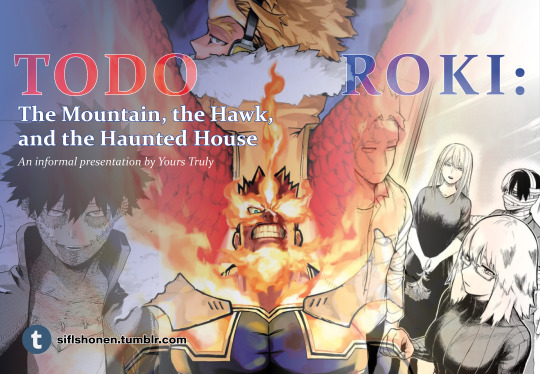
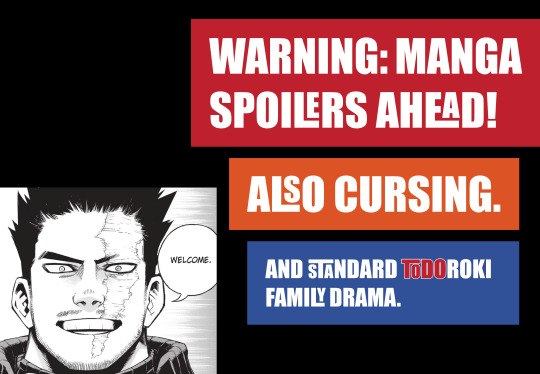
Whenever a work from one culture or language is brought to another (or even if the work stays in the same culture but transitions from page to screen), the translators, localizers, and creative team handling it can only do so much to help the new audience understand what the original work communicates through subtext or cultural associations by deciding how much of the work to leave out or change. In other words, the team must choose how to fail.
In the case of the Todoroki family, I feel there is much lost in translation. Or, at least, there is much lost if the reader doesn’t share the work’s original cultural background. I’m going to try to make my point with a poem.
Four children are mine
And I love my four children:
An arrow to ward away the darkness
aimed for the light of the dawn;
The winter, who brings the night again, beautiful and longer;
Next the summer,
who returns the sun at its zenith;
And small is the leader with clear sky and dusk rain in his eyes.
Four children are mine
And with four comes death
The arrow flies too high from the bow
The arrow flies but falls to darkness
From a shrine in the mountain, he aims for me.
My son haunts the mountain near the peak
I fear the mountain I cannot climb
I fear the arrow meant for me.
Winter settles quietly
Summer turns away from me
The leader makes a mirror of my heart
I tell my son I love him
And I look in the mirror yet I cannot face it but to watch it crack
My son is my spitting image
I tell my son I love him
I tell my son
Without looking into his eyes,
I tell my son I love him
As the arrow flies.
This poem is about Enji Todoroki and his children - the four he actually fathered and the one for whom he unknowingly acted as a surrogate. The poem vaguely alludes to the meanings of the children’s names with one notable change - for Shoto Todoroki, instead of calling him “charred frozen” - which is basically how his first name is written - I called him “leader”.
When written with different characters in Japanese, “Sho” can mean “leader.” So, while “leader” isn’t the true meaning of Shoto’s name, I decided that it was thematically fitting to use since he’s also the “hero of his family” and leads the way for them to continue into the future. In changing the meaning of Shoto’s name, I chose how to fail. Yes, it’s imperfect, but by putting in the work, I can at least show you how I arrived at the destination to help you better understand what you are reading. Much of what I’m about to write about falls into this category - it’s not exactly the perfect explanation or whole, unaltered, canon truth, but is supplementary information to help you come to your own conclusions.
Anyway, now that I’ve told you the poem is about Enji and his children, it probably comes off a little differently, huh? That’s the power of writing allegories and using recurring motifs. If you have not figured it out already, you’ll learn soon enough what words symbolize each child.
Now, let’s break down this already broken family. There are so many damn Todorokis that I’m going to do something very, very rude and call them each by their first name for the sake of clarity (and also because, frankly, it’s a more honest representation of how I actually feel about these characters.)
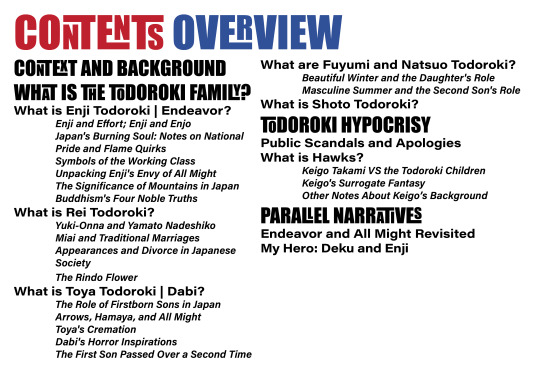

What is the Todoroki Family?
The challenges facing the Todoroki family - such as the pressures Enji feels, the disappointment and internal crisis Toya inherits, the social and marital prison in which Rei finds herself trapped, the nature of the public’s feelings of betrayal at the reveal of Enji’s family dysfunction, the social snafus and ugly family dynamics in which Natsuo and Fuyumi are often caught - are distinctly shaped by the series’ Japanese society. There’s a special je ne sais quoi quality to their family drama that feels authentic even to me, and I’m a foreigner to these cultural tropes. It’s a little disturbing.
But, besides a fictional family, what are the Todorokis? What purpose do they serve in the story? What is their purpose within the narrative, and what is the purpose of the narrative in which they exist?
Well, on the one hand, the Todoroki household can function as an allegory for traditional Japanese families, society, and power structures (we could use the word “patriarchy”) crumbling under the pressures of modernity and a changing world, which is similar to how the Shimura household functions in Shigaraki’s backstory, or even the story of All Might’s retirement. On the other hand, they are a case study of a deeply flawed family that, if the magic-powers quirk element was not present, could exist in the real world.
They make for good drama. But every member of the household serves a purpose in the narrative, in the family, and in the meta. Usually, these three things work together for a greater purpose.
What is Enji Todoroki?

I didn’t say, “Who is Enji Todoroki?”. I said, “What is Enji Todoroki?”
If you said, “an asshole and shit father,” well, yeah, you’re sure on to something! But it’s not helpful to disengage with a major character in a work if you want to understand what the hell they’re doing in the narrative. I’m not telling anyone to like Enji, or any Todoroki, but I am asking that you entertain the concepts behind them with an open mind, if not an open heart.
What is Enji Todoroki? Much of this should be obvious in any language, but I’m still going to break it down.


The manga tells us pretty blatantly that he is a man from an older generation struggling to remain relevant in a new and changing world. He is ambitious, prideful, hardworking, hypocritical, and wholly dedicated to his job. He’s the patriarch in a household structure that is no longer relevant and coming apart at the seams. But most of all, Enji is afraid that nothing he does will ever be enough.
What is Enji Todoroki? Enji is someone who tries his hardest at anything he does even when it sends him to ruin.
Enji and Effort; Enji and Enjo
In my Bakugo and Deku presentations, I mention that the concept of talent as a fixed quality is predominantly accepted in the west while a common eastern perspective posits that talent is something developed over time. The distinctly Japanese Enji and his personal conflict over the existence of the “natural born”, western-coded All Might thrusts these implied concepts of talent from subtext (not that they were particularly hard to identify throughout the manga) into blatant text. And I’m not just talking about the moment where Enji thinks to himself, “I have always envied natural-born superheroes.”

The written characters for Enji’s given name means effort. The name also sounds like another word for “fuckin’ honkin’ bigass fire”, Enjo, but for our discussion, Enji means effort. Endeavor, his self-chosen hero name, also implies the application of effort.
Everything about this man is defined by his efforts, even when they are in vain. Everything.
He pours his effort into becoming Japan’s greatest Hero. He pours his efforts into escaping the fate of his father. He pours his efforts into making the most terrible domestic choices possible to try to be enough for his family. He pours his efforts into atoning for his transgressions against his family, and then again for those against society. And it is not enough. He knows it is not enough, it never will be enough. Not one thing he has ever done in his life has been enough for him, enough for his family, enough for society. It is never enough. This is his burden.
You don’t have to feel bad for him about it, mind you. I’m just telling you that it is, functionally, his core struggle.

Enji poured every bit of himself into looking away from his son Toya and into running away from him. It’s going to take every bit of effort within himself to stand his ground and face his son again, and even then, he is still going to need help. Perhaps that’s pathetic, but even Enji knew he was only going to be a professional Hero, never a superhero.
Enji is a man who believes, who is basically required to believe, who likely cannot continue to exist if he does not believe, that his value and justification for being is defined by his ability to pull himself up by his bootstraps, or to just keep struggling in the endeavor.
He pours his effort into everything he does and curses his own weaknesses. Even struggling takes effort.
Japan's Burning Soul: Notes on National Pride and Flame Quirks
In my Kirishima presentation, I talk extensively about kouha and their manly aesthetic as it applies to symbols of Japan. What the presentation doesn’t talk about are flame motifs.
In Japan, flames are seen as purifying. They are also seen as manly, and not just in the way Kirishima defines it. There’s several phrases in Japan that talk about stuff like “a burning soul” or even “Japan’s burning soul” or the “blazing spirit” of a Japanese youth. Well, I think these are just about as tacky as they sound but in the same kind of boyish, tacky-cool way most shonen anime can be.
I’m talking about the flame motif on festival jackets. I’m talking about every time Galo from Promare talks about his “flaming firefighter soul”. To some extent, I’m talking about the flames on the Hokage jacket in Naruto (Minato’s and Naruto’s jackets get the flames as a nod to their shared mentor Jiraiya, who is a whole-ass conversation about masculinity in culture, theater, and mythology in and of himself.) These examples are indicative of each of these characters’ pride in their masculinity and in their nationality. Enji’s flame quirk and his constant use of flames as a brand are no exception to this trend.
Some minor characters, and later Dabi, allude to the fact that flame-based quirks are somewhat common in MHA. I’m not completely certain if the prevalence of flame quirks is also meant to indicate that these quirk holders share the same sort of “flaming spirit”, background, national pride, or even miscellaneous political views, but somehow I get the feeling that it does.
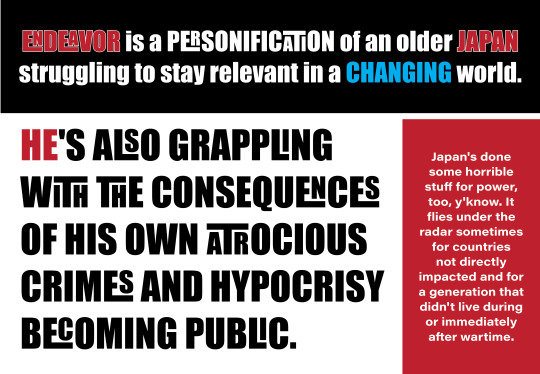
These people are, on some level, connected in that they possess the flaming soul of (masculine, old, patriarchal) Japan. The existence of Pro Hero Endeavor is a representation of the traditional, conservative Japan’s soul. All Might may wear red, white, and blue (and yellow like a yellow-haired westerner) to represent a certain set of foreign ideals, but Enji wears the red and the blue with distinctly Japanese pride.
The Colors of a Nation

Red and white, the colors of the Japanese flag, have strong cultural connotations through Japanese architecture, festivals, and shinto practices. (Please keep in mind that colors can mean a lot of things in every culture depending on context, and in Japan, different shades of the same colors can also hold distinct meanings. For example, certain shades of blue are often worn by villains in theater, but blue is not always “evil” or “villainous” by default.) But the color that I personally associate with Japan is blue - specifically, anything dyed with the aizome technique.
Aizome clothing, or clothing dyed with indigo, transitioned from being a nobility-only thing to one of the few colors that commoners could wear starting in the early 1600s - because by then, bright colors were exclusive to the nobility. The indigo dye is also popular for its antibacterial, insect repellent, and flame retardant properties. Firefighters wore it. Samurai wore it under their armor. So it’s not surprising to me that Endeavor’s Hero costume, and that of his son, would use fabric in a particular hue of dark blue.
Also? If you wanted to know? Aizome is used to dye Japanese blue jeans today. Hey, Best Jeanist!
Anyway, Enji is dressed in the color of the common Japanese man, the firefighter, the samurai, the noble laborer or honorable servant - but definitely not of high nobility.
We don’t know a ton about Enji’s background in detail, we know he wasn’t born ungodly rich. We know his father died. We know he went to UA. He made money from his Hero career, and married into a pedigree. Yes, he chose Rei because she had an ice quirk, but got the bonus of clout and old world connections.
So, uh, yes, the marriage of Enji and Rei was one of new money and big ambition married to old nobility and traditional values, and that’s true even when taking the kids out of the equation. But more on Rei and the marriage later.
Unpacking Enji's Envy of All Might
The majority of Japan’s political scene is conservative. (Look at the ideology column in that table, NOT just the name of the party. If you’re a westerner, I realize that identifying which ones are conservative is going to be particularly difficult to do given their translated names.) The Jiminto, or Liberal Democratic Party (again, look at the ideology column, NOT JUST THE NAME OF THE PARTY. Remember that “liberal” and “democratic” can hold different connotations in different countries!) was founded in 1955 and, despite having a nebulous identity beyond being “kinda to the right”, continues to hold a significant majority. Over the years, the party has commonly been seen as reliable, stable, and able to get the job done. Well, except for during those periods of time when the scandals came out.
This is not unlike how the public of MHA saw Endeavor. Well, until the scandals came out.
Now, I do not think it is correct to say that Enji = the Jiminto and leave it at that. (I would, however, call him a personification of Japan’s modern patriarchy, or at least something pretty damn close.) His dogged, openly vocalized grudge against All Might is more extreme than what the majority of the Jiminto might openly express, especially considering their consensus of policy regarding the US. I only want to give some context to the longer-standing political scene of Japan as it affects the modern day.
See, while Japan and the US have had an enduring relationship and are, uh, well, allies now, the older generations of Japan, particularly in rural areas, still hold deep grudges against the States and are bitterly, bitterly angry at the cultural imperialism and the military takeover and the government policy changes and the economic changes and the, well, the everything. Actually, the mutual cycle of envy between the Japanese and US citizens detailed in that Times article is important to remember from both perspectives. There’s old bias against each country lingering in both directions, and, while not a direct reference to how it remains in the Japanese population, understanding how it affected the creation of Japanese internment camps in the US is very illuminating in understanding the public US sentiment about the Japanese before WWII then after it.
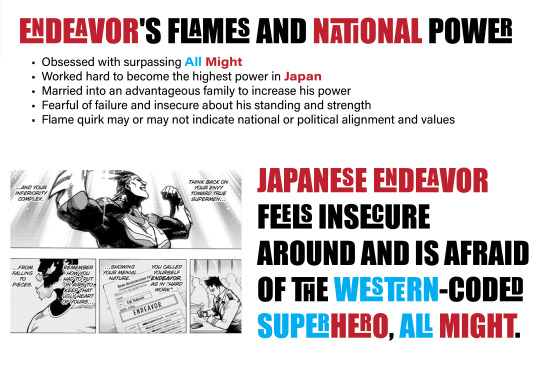
When Enji, (or Endeavor), discusses his inferiority complex, he gives away the game and makes the subtext of the rampant western envy present in many of the characters in the work burst out into just plain text.

While Toshinori Yagi is a Japanese man, the power he inherited, or what Enji (and the world) wrongly believed was “natural-born talent” (a western concept), blatantly signals “western power” through his costume and art style (US comics!) and he represents the “band-aid” of temporary western military and socio-political power imposed upon Japan.
The US is considered a superpower, after all.

That said, I do feel that giving the western-appearance clout (and magic quirk) to the Japanese Yagi aptly communicates that there is nothing naturally special about the US or its citizens, or really anyone who has power. All of that misunderstood “special glow” or “flawless perfection” or “incontestable strength” are just appearances, presentation, circumstances, and luck - nothing more and nothing less. Yagi (who is, again, Japanese, so this is a Japanese man displaying the incredible aptitude for superheroism, to Enji’s surprise and probable chagrin) may have had a knack for using the quirk and therefore was the greatest at winning and saving, but he also destroyed himself trying to be the perfectly westernized superhero.
Also, by comparing the obviously westernized Katsuki Bakugo and pridefully Japanese Enji Todoroki, Horikoshi makes his point that a shithead is a shithead regardless of nationality, background, or philosophy.
At the same time, both characters have the ability to change.
Speaking as someone from the US, I’m conflicted, humbled, creeped out, and very emotional over the fact that Horikoshi has chosen to have a complicated, sometimes critical (early Bakugo’s westernisms are not flattering, and the westernized persona of All Might is an unsustainable, unrealistic, unfair thing that destroyed the man maintaining it), but overall kind, laudable, and compassionate portrayal of characters that stand in for the west.
I’ve heard Horikoshi has been criticized as a “freeaboo” for the open admiration of the west inherent in My Hero Academia. I’ll admit, I think he might be a little bit of one, but I’d be the cat calling the monkey a long-tailed bastard if I didn’t also admit that I’m a bit of a weeaboo. We can be mutually embarrassed about how much we like each other despite everything, I guess.
But back to Enji and Yagi. Enji bitching about All Might and expressing disgust over his “American” presentation and perceived advantage is, um. Well, I could call it an example of him making excuses because Yagi is actually Japanese, but it is true Yagi gained experiences and some training advantages in the US that Enji did not have. And, like, Yagi also got a magic quirk (from another Japanese person.) That’s something.


But I digress. The irony and realities of Enji’s envy and self-deprecation could be debated all day, but it doesn’t lessen the stink of hostility and western envy wafting off of it.
The Significance of Mountains in Japan
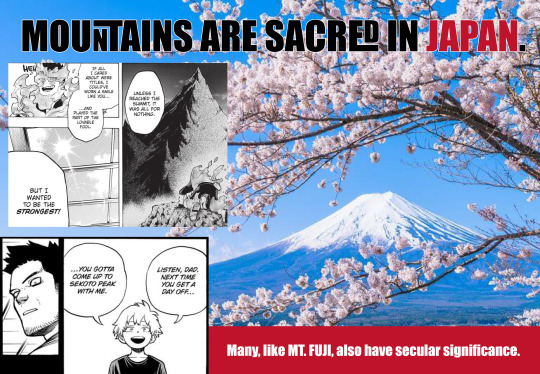
You know about Fuji-san, or Mt. Fuji, the largest and most iconic mountain of Japan? Awesome, because it’s Japan’s most famous cultural site and a great case study for how the Japanese view mountains as sacred. People hike Mt. Fuji and other sacred mountains for secular reasons, too, sure, but many do so as a spiritual pilgrimage. It’s a mixed bag, sort of like how, in the west, everyone is impacted by and understands Christmas despite how it’s primarily only modern Christians that have religious traditions regarding it.
Sekoto Peak, the in-story location where Enji sometimes trains and Toya burns himself, doesn’t actually exist and therefore has no real-life associated myths, but Enji’s choice to train on it indicates much about his discipline. It also provides a quiet association between honing his abilities to their pinnacle and his connecting to the understood sacred power of the mountain. There’s a mystical element to it.
Most, if not all, Japanese mountains are considered sacred in some sense no matter how tall or pretty they are. This is just understood. Many mountains are the sites of one or more Buddhist or Shinto temples.
Ah, and since many mountains are volcanoes, it shouldn’t be terribly surprising to think of them as residences for fire elementals or other kami and spirit figures. Or even demons.
Enji’s view of All Might as standing on the peak of an even higher mountain, or even perhaps BEING a mountain himself that Enji is unable to climb or conquer, is analogous to him realizing he is one insignificant human man in the face of a force of nature. All Might is not unlike a kami (god - though please remember there is a difference in attitude between those that worship and honor a god versus those that worship capital-G God) to Enji in this sense, but it is perhaps more correct to say that Enji sees All Might as someone who was able to make the pilgrimage to the highest peak and reach enlightenment, thereby becoming divine, while Enji himself is incapable (and therefore unworthy. Because he’s not working hard enough, obviously! Or at least, that’s what Enji thinks.)
If you’re a reader in the Christian-based-background west, you’re likely thinking this is like saying Enji sees himself as a filthy, nasty sinner who is going to hell forever. This isn’t NOT sorta kinda partially in the neighborhood, but that would be a much more punitive, permanent, and fixed view than a Buddhist or east Asian perspective. It’s also missing the point. Readers can want whatever they want, but they shouldn’t necessarily expect this story to absolutely intend to make Enji burn in hell forever through outside forces (because he definitely is doing it to himself, at least currently in this lifetime. Burn, asshole.)
Buddhism’s Four Noble Truths

Rather than a Judeo-Christian sensibility, Enji’s story (and Deku’s, and Bakugo’s, and Rei’s, and Shoto’s, and Uraraka’s, and Toga’s, and Shigaraki’s, and…) more closely resembles Buddhist philosophy and the journey of someone coming to understand the four noble truths - and it ties into Enji’s own discovery and understanding of these truths, which is a journey basically every damn character in this series is going through - if not for their own sakes, then for the sake of learning it on behalf of someone else. That link has a detailed writeup, but here’s the brief:
The First Noble Truth (dukkha) - everyone suffers, and suffering is part of the world. Enji knows this one intimately.
The Second Noble Truth (samudaya) - something causes suffering to happen. In Buddhism, most things that cause suffering are related to having desires for material things or status. Enji learns that he and his desires are the major source for his own suffering and for that of his family.
The Third Noble Truth (nirodha) - knowing that suffering can end. Like, in the abstract. This is acknowledging there is a way it can happen even if one doesn’t know what it is yet.
The Fourth Noble Truth (magga) - knowing there is a way to end suffering. This one is about an action plan. Enji’s action plan is to give his family a new home to live in that does not include him. Later, he realizes he must apologize to the public and continue to do the only damn thing he can to contribute meaningfully towards ending their suffering: keep being a pro Hero even if he can’t be a superhero.
Does knowing or doing any of this purify him? Well, sort of, through the fire ‘n flame of the grueling ordeal of fighting All for One notwithstanding whether or not the public and (some of) his kids still hate him afterwards, but nah, not really.
In some ways, this is a nice quality that My Hero Academia has - that characters still want things, are allowed to want things, and their desires are treated as natural. Sometimes heroic, even! The characters’ ensuing suffering is also a natural and realistic consequence, but that’s a-ok - everyone will still plug along and do their best to try and reach a collective enlightenment. A constant state of enlightened perfection is not attainable nor sustainable for the mortal, which is why the concept of enlightenment through an ongoing cycle of rebirth exists rather than in the form of an immediate reward, but that doesn’t mean we should stop in the endeavor of striving for it.
So that’s what Enji Todoroki is: an illustration of how action through atonement is always better than sending someone or pushing someone to send themselves to hell forever, thereby never allowing them the opportunity to escape the wheel of life.
What is Rei Todoroki?
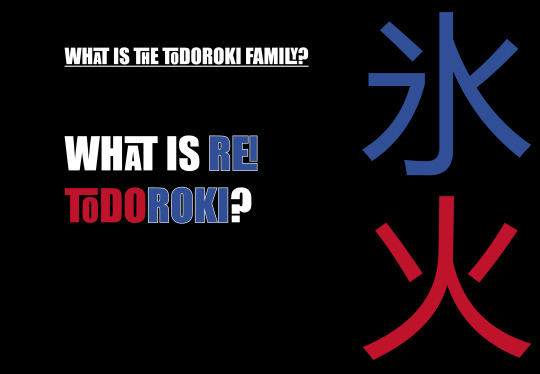
Rei is a daughter of prestige and her family’s last hope to stay relevant. She’s a woman raised in and trapped by the obligations, power, money, and structure of an old society that is doing everything it can to keep from crumbling.
But she’s also complicit in helping to uphold it. Rei is definitely a victim, but she’s also definitely a perpetrator. ‘Cause that’s how it works - people under the thumb of one kind of authority or abuse often perpetuate it and continue the cycle.
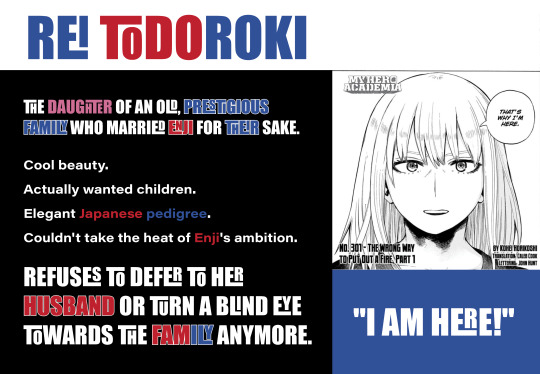
Rei’s given name means, as written, cold. It’s simple, but fitting. She is often emotionally unavailable and unable to connect with Enji and her children (especially Toya, but that’s a two-way street.). It’s one of the contributing factors to why she didn’t “see” her son.
Yuki-Onna and Yamato Nadeshiko
A yuki-onna, or snow woman, is a figure from folklore. They are described as beautiful women who appear on cold and snowy nights. The Wikipedia page I linked gives a good picture of the wide variety of yuki-onna stories out there and of the nature of this figure for your reference. But Rei, while a more human character, definitely suggests a yuki-onna. I think the stories that associate the yuki-onna with children, specifically the one where she asks strangers to hold a child (and survive holding it, in which case she generously awards the holder) or associate her with mountains, are the most interesting for this discussion considering the other mythological and cultural associations present in the Todoroki family.
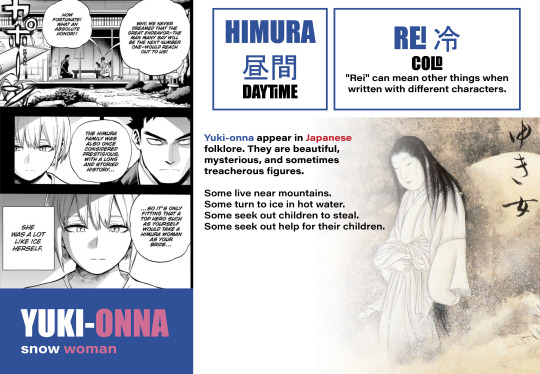
Rei is also a sort of yamato nadeshiko figure, or an idealized Japanese woman. TVtropes did my work for me on this one:
“Being a yamato nadeshiko revolved around the Confucian concepts of Feudal Loyalty and Filial Piety, which…meant acting for the benefit of one's family and obeying and assisting authority figures…Virtues include(d) loyalty, domestic ability, wisdom, maturity, and humility.”
A nadeshiko is, in English, a dianthus. I know it by the colloquial name Sweet William.

The white-edged flowers kinda looks like Fuyumi’s hair, no?
However, Rei is a yamato nadeshiko with a twist! Rei’s character starts out as a doormat, totally broke and unable to handle life in the Todoroki house, and then later finds the resolve and underlying “iron will” to face Enji, the family, and her mistakes again. Women aren’t naturally “perfect” in any sense of the word, ever, and they definitely don’t naturally (or even unnaturally, even through dogged effort) fit the mold of the yamato nadeshiko (at least, not every waking second of their lives.) But they can grow stronger over time, just like everyone else can. Rei becomes more like a “true” yamato nadeshiko after she stops trying so hard to be one for the sake of upholding her marriage and socially-acceptable appearances and instead approaches the situation from a place of collected, experienced resolve.
Yamato, as all these sources’ll tell ya, is an old term for Japan. “Yamato” is the name of the clan that set up the first (and only) Japanese dynasty as well as the name for the actual seat of government they created (and yeah, the Yamato seat was located on a mountain.) Today, “Yamato” is also the ethnic majority of modern Japan. Wikipedia has the most succinct brief on how Japan, despite its efforts to brand itself as one homogenized and harmonious Yamato people, definitely ain’t one.
Likewise, the yamato nadeshiko was a propaganda tool to encourage women to behave “correctly” and paint the picture of a desirable Japanese woman. The unreasonable expectation of women to reach the standard of the idealized yamato nadeshiko was, and is, total bullshit.
Miai and Traditional Marriages
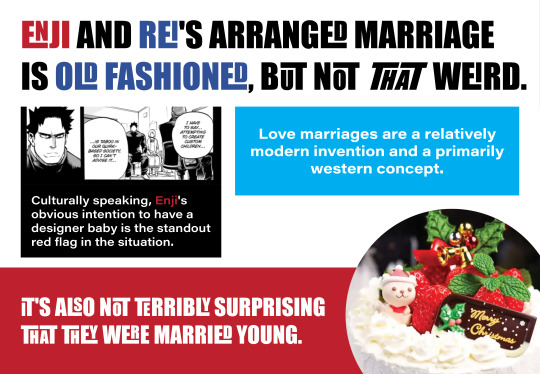
It’s old-fashioned, but not scandalous or inherently skeezy that Enji and Rei had an arranged marriage. Miai, or matchmaking meetings, are still a thing today in the real world and would likely continue to be a thing in the analogous-to-the-real-world’s-present future setting MHA presents, especially for someone like pro Hero Enji. He didn’t have the time or interest to date around, and he needed a marriage of business and mutual interest rather than love (and I don’t just mean “marriage of business” for the purpose of producing designer kids, though that is absolutely what he did and everyone involved even knew it.) Rei’s family are also exactly the kind of family that would desire miai to arrange the most mutually beneficial marriage possible - regardless of Enji’s involvement.
In the grand scheme of history, marriages for love being the accepted norm is exceptionally modern, and while love marriages are increasingly common in many places including Japan, they certainly are not “traditional”. Here’s a blog about Japanese marriages written in 2002 that may contain some interesting tidbits bridging the new and old traditions. Here’s a brief history of marriage in Japan.
Also, Enji and Rei were married young. Overall, the Japanese, especially women, are expected to marry young, though the mean age for women at their time of marriage has increased as time has passed. There still exists, especially for Japanese women, an expectation to marry younger, or at least marry while “in their prime”. If you watch anime, you likely already know what a “Christmas cake” is in modern slang. (That article does a fantastic job of illustrating western envy and postwar Japanese cultural shifts using the adoption of the Christmas cake as a case study.) If you don’t know, a Christmas cake is a slang term for an unmarried woman over 25. Because apparently, a day over 25 means she is past her prime for marriage and has “expired”.
Marriage fulfills certain social obligations even among middle- and lower-class Japanese citizens, but while Rei would not be alone in feeling the pressure to get married for the sake of her family, she would feel it the most acutely because of her status.
Appearances and Divorce in Japanese Society
Rei could divorce Enji, it’s true, if she had his agreement to do so or if she had sufficient evidence to prove it in a Japanese court. Which, good luck. Because while we know Enji was brutal and abusive in training, which parent actually burned Shoto and left a lasting scar? That’s right. Rei did.
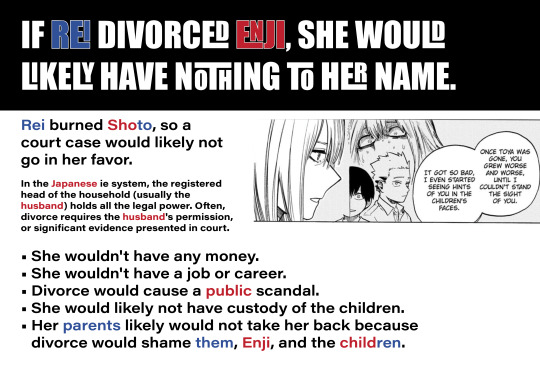
So Rei’s divorce likely would have totally fucked her and the children over. For one, she’d be stripped of the Todoroki family name and likely any Todoroki assets, and since she’d be breaking the deal made between Enji and her family, her own family likely would not take her back!
Divorces are becoming more common in modern Japan, but it’s important to remember that the stinging double-standard of “divorce is okay, except if it’s ONE OF US” that the upper classes (or just the exceptionally proud or wealthy) impose on themselves is brutal. If the public knew Rei had divorced and were given no context - which they wouldn’t get because shaming one’s (ex-)husband and family by sharing those details publicly would be considered crass and unthinkable - the public would likely rip her and the children apart even if they ripped Enji apart, too.
Remember: keeping up appearances is everything in Japanese society.
Rei living outside the house in a facility for her mental health is already shameful and potentially scandalous enough, and it wouldn’t do her any favors in court regarding custody of the children, anyway. Instead, she chooses the limbo of remaining married, but separated.

The Rindo Flower
Yes, I have read meta about Rei’s favorite flower being a rindo flower. I’ve seen it in this post from @foundouthatdabiistouyatodoroki and on Reddit, as well as just, like, around the fandom. I agree that the flower’s presence is often a stand-in for Toya, but I also think it stands in for the ghost of Enji’s, well, not exactly love, but his affection and promise to Rei made via their marriage.
Remembering that Rei likes a flower and showing that he remembers is kind of, like, the bare minimum, but it’s somethin’, I guess.
The rindo, most likely the Japanese gentian in English, is, well, a gentian.

The flower’s color suggests the indigo of the aizome dye, a traditional Japanese color, and its meanings include compassion for sorrow, justice, and… victory. When held upside down like Rei presents it during the hospital scene, it implies loss. (The gladiolus, which the article mentions as another flower of victory, is named because the leaves and shape so resemble a sword. Well, to the Romans, the word for “sword”, and was also a euphemism for a dick. Gladiators, or “sword-ers”, were talked about in terms of their masculinity, victories, and how many other things they penetrated with their “swords”. Real classy. Source? All my history classes.)
Considering Rei’s status as a sort of “blue blood”, I think it’s interesting to note that gentians are the flowers that appear on the Minamoto crest (though the crest most likely uses the less-specific-than-the-rindo balloon flower from the same genus.) I don’t know if associating Rei (and her kids) directly with one of Japan’s major noble clans (and the same one that the Tale of Genji centers around) was Horikoshi’s primary intention, but I think the connection is still worth talking about.
As that Wikipedia article can tell you, the Minamoto name was once given to imperial family members who could not inherit the throne through the family line. It’s fitting for Toya, considering how his father decided he couldn’t be a Hero that surpasses All Might despite being the firstborn son who was created for that explicit purpose.
Let’s talk about that, actually.
What is Toya Todoroki | Dabi?
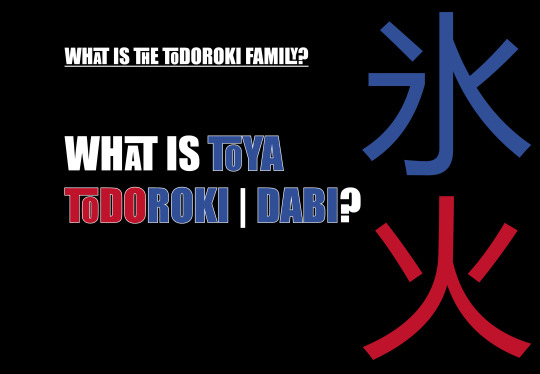
What is Toya? He’s the first son of a wealthy family with noble blood in him who was utterly crushed by the thought of failing to uphold the social obligations into which he was born.

Personally, I consider Toya to be the most fragile major character in the entire series, contested for the spot only by his own father, Shigaraki, and possibly early series Bakugo.
Toya, or more precisely Dabi, is Enji (and Rei) Todoroki’s very own monster. Instead of a “perfect creation” like intended, he became, well, whatever you want to call Dabi.
But let’s talk about Toya first.
The Role of Firstborn Sons in Japan
Firstborn sons are fucking important in Japan and in many other eastern cultures. Generally, they are obligated to inherit just about damn near everything and, in return, are tasked with basically all the responsibilities of honoring their parents. A Japanese family isn’t just a series of blood ties, but an institution. This system, called ie, has its own legal rules. Under the ie system, the firstborn son and his wife (who is likely doing most of the caretaking) live with the parents to continue the household. The other kids are expected to marry out or go start their own families.

Of course, not every single family follows these rules, but the social norms and pressures to uphold them exist. This academic paper written in 2007 analyzes why certain children in the birth order may live with (or near) their parents and explores several factors that impact this decision within families (usually related to whether or not the parents are providing childcare for the grandchildren.) Here’s a fun quote from page 3:
“...the first-born child generally lives with or closer to his/her parents than the second-born child, a result which is consistent with both our theoretical model and Japanese social norms. Second, there is one exception. If a first-born child is a female and she has at least one younger brother, then she locates farther away from her parents than her younger brother even though she is a first-born child.”
More on that “second” part in regards to Fuyumi later.

But, like with most cultures, the more traditional (and established and wealthy) a family is, the heavier the predetermined responsibilities of each household member weighs on them. And Enji Todoroki’s family is high-profile. So, you can imagine that the pressure placed on Toya is immense.
The pressure placed on firstborn son Tensei Iida was immense, too, but their family dynamic was totally different. The Iida family was, like, healthy and functional. Wild.
Moving on. So Toya was not only youthfully excited to impress his father and support his family as the firstborn son, but he was also, in a certain sense, socially conditioned to want to do so.
To me, this is where things get interesting. Toya’s struggle is not against his parents for crushing his dreams of a life beyond what they and their society’s established roles provide him. Instead, it is the opposite. Toya’s parents are ready to shake up the established family formula and free Toya from many of the obligations of firstborn son duties. Toya is not ready for any of that newfangled modern sensibilities nonsense. According to tradition, Toya’s role and life should be set and secure.
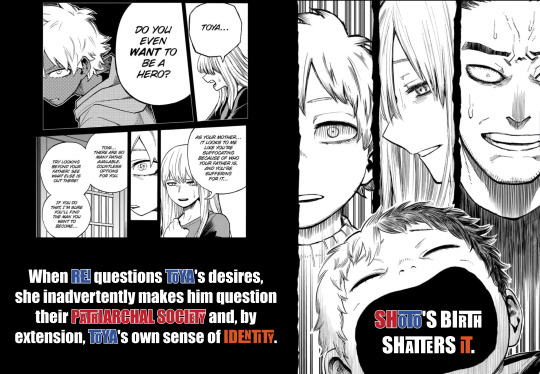
When Rei asks Toya if he even wants to be a Hero, she inadvertently makes him grapple with the possibility that carrying on the family business (or at least carrying on the to-be tradition of becoming the Flame Hero and surpassing All Might per his father’s wishes) is not a given. Other choices exist. Rei’s question, while well-meaning, creates a fissure in Toya’s faith in the patriarchal system from which he developed his entire identity.
If Toya, the first son, can’t use his flames, isn’t a Hero, doesn’t inherit, and won’t continue to live with the family, who is he? If he doesn’t fulfill that role and those obligations, is he worth anything to anyone, even himself?
Conventional wisdom says no. He would be a disgrace and a failure even without Enji’s dumbass “create a genetically ideal child to use the ultimate flame quirk to surpass All Might” scheme in the mix. For Toya, it was never about surpassing All Might, not really. It was about fulfilling his household role and showing his father that he was worthy of being in the family.
When Shoto was born, Toya saw that door slam shut. After that, his inability to embrace another way of life leads to his undoing. But he is also, you know. 13.
Toya, through no fault of his own, cannot handle his father’s flames - not his flames of sheer power, not of mindless effort, not of personal fear, not of burning western envy, not of national pride, not of anything. But Enji burdened Toya with them anyway.
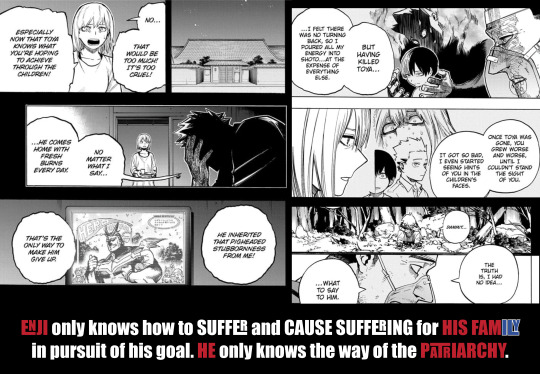
Arrows, Hamaya, and All Might
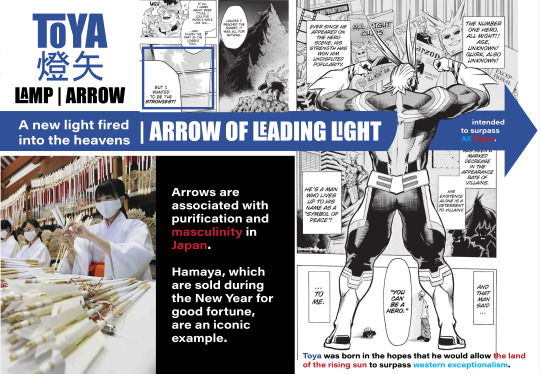
The characters in Toya’s given name mean “lamp (or, like, a light)” and “arrow”. @skyflyinginaction and their mutuals have an early discussion about his name and its possible meanings as well as a discussion about symbolism here that’s fun to read, and I’m always happy to not have to do any more work - er, happy to give credit where it is due for research and thoughts. But I do have more to add.
Arrows and archery have particular connotations in Japan. The ones I most commonly think about are hamaya, or evil-warding arrows, used ceremonially. Hamaya can be purchased at temples to be displayed in the home as luck-bringing or evil-warding items. Of course, the bow is also a significant evil-warding symbol, and the bow and arrow are often meant to appear together as a set of evil-warding objects, but yanno. Whatever works.
Anyway, around the New Year, archery contests and traditions abound as a way to predict the coming year’s fortune or ward off evil. This blog entry details one day of tradition in Ibaraki as well as the associations with masculinity and, erm, promoting fertility.
There’s one more tradition I learned orally, so I can’t source it, though the purpose for it was different than the one I just linked. In the one I was told, the head priest opens the yabusame (horseback archery) ceremony by firing an arrow through the temple gates and off the side of the mountain to slay an invisible demon. The firing coincides with the sun’s placement and becomes, much like Toya’s name suggests, an arrow of light.
In any case, arrows are associated with luck, sons, and warding off evil. I get the sense that the “arrow” in Toya’s name brings all of these cultural associations into play. More specifically, I get the sense that Toya was meant to be the “arrow of leading light” meant to slay the “evil” of the west, All Might, and purify that uppermost and unreachable peak where All Might stands in Enji’s mind. Don’t quote that, though.
‘Course, the “guiding light” or “purifying light” implied by Toya’s name eventually becomes perverted from its original purpose.
Toya’s Cremation
According to the manchild himself, Toya died not when he burned the shit out of himself on Sekoto Peak, but when he thought his family had replaced him. That’s when he says Dabi was born.
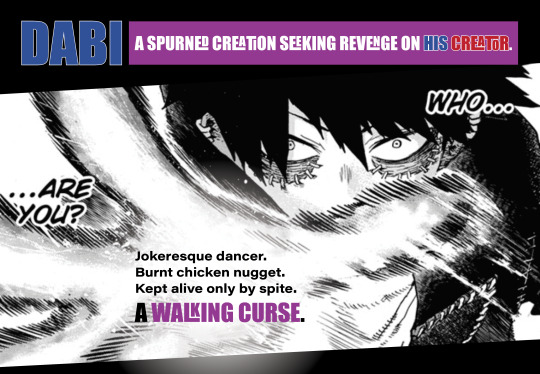
The word Dabi means cremation. Heh. The enthusiastic @foundoutthatdabiistouyatodoroki posted about why and how it may be written as something indirect instead of something more direct for the sake of Japanese sensibilities.
I’d also like to point out that Toya’s body was not properly, ritually buried or cremated in any sense or tradition. This is important, since the failure to do so often prevents the spirit from passing on to the afterlife!
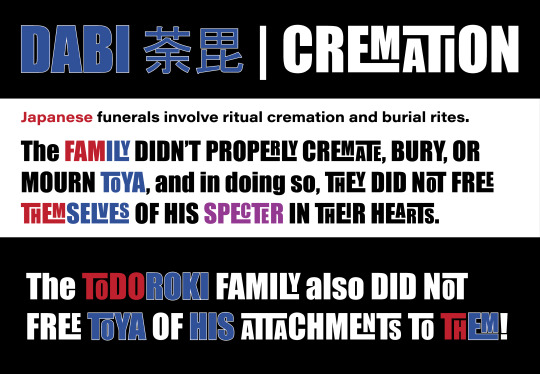
Arguably, Toya cremated himself, but not all the way and not in the way that aligns with the intentions and purpose of a kotsuage, or funerary cremation ritual. Also, his family did not pick out his bones - the authorities did when they found a piece of his jaw. That linked article talks more about the significance of the tradition, but put simply: the family didn’t properly mourn Toya, and in doing so, they did not free themselves emotionally of his specter. They also didn’t free Toya from his attachments to them.
This life-to-death stuff is a two-way street, and Toya’s soul was left hanging onto a burned, rotting corpse by the thread of his own grudge. He’s a modern horror story.
Dabi’s Horror Inspirations
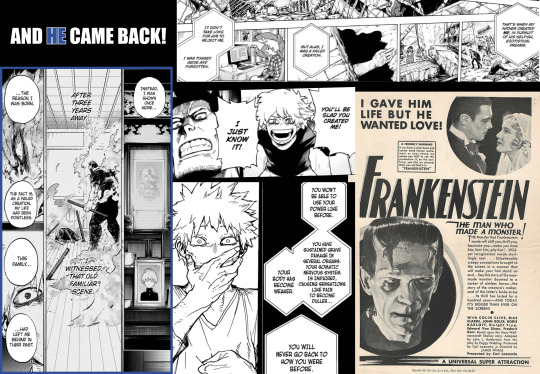
That’s right, Dabi fans! It’s time to talk about the well-known Frankenstein allusions present in the character - though I’m pretty sure Horikoshi pulled from the 1931 film and not the book. Whatever.
As Toya, Enji’s creation was an ice quirk + a fire quirk instead of a (cold) corpse + a reintroduced (hot) spark of life (and later, half of his “father” Victor Frankenstein’s own brain) like Frankenstein’s monster. Frankenstein’s monster’s weakness, at least in the movie, is fire. In the book, fire is still present and double-edged.
As Dabi, Enji’s creation is a reanimated corpse (wow!) + a twisted sense of self created from Enji’s own will (wow!) who seeks revenge on his creator and family for his loneliness and creation. His weakness is, uh, yeah, it’s still fire.
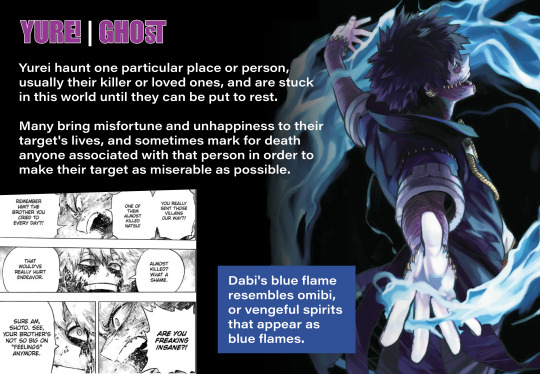
While Enji is not the one who recreated and revived Toya as Dabi, it is Toya’s grudge (and desire to see and be seen by his father) that keeps him alive. In fact, Dabi is a really cool twist on a yurei or perhaps an ikiryo since he is technically still alive. Still, Dabi most closely seems to follow the patterns of an onryo, which is a more specific form of yurei. These spirits, and the story of one in particular, are the inspiration behind the Japanese Ju-on: The Grudge movies (and then their US-made counterpart.) Here’s a bit from the onryo entry from yokai.com not ‘cause it’s the most academic, but the most succinct:
“Their motive is always the same—vengeance. Onryō are easily powerful enough to kill anyone. However, they prefer letting the object of their hatred live a long life of torment and suffering, watching loved ones die in their stead. Onryō inflict a terrible curse on the people or places that they haunt. This curse can be transmitted to others like a contagious disease, creating a circle of death and destruction far more devastating than any ordinary ghost.”

You may decide that the entry for the gyoro or another yurei suits Dabi better, but surely you see the point that he’s playing the role of some kind of ghost. His eerie blue flame suggests onibi, or resentful spirits taking the form of blue flame. Wikipedia also does me a big favor by mentioning the overlap between onibi and European will o’ wisps, which usually lead people astray towards goals they can’t reach!


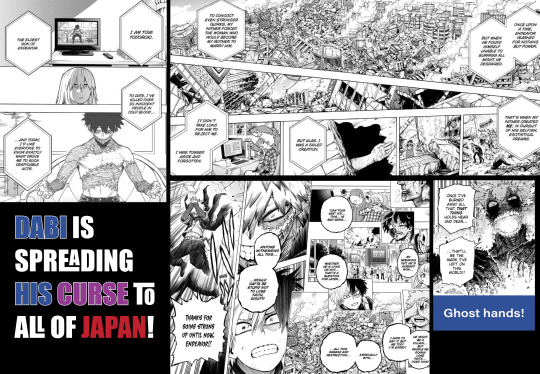
It really would have been better for everyone if Toya hadn’t pursued the incredibly hot blue flame, huh? Instead, he just burned out fast. Kinda dissappointing and anticlimactic - like a dragon’s head on a snake’s body.
Yeah, that’s right - Dabi seems to have renamed himself “dissappointment”. Heh. Tweens and teens really are the funniest people on the planet.
The First Son Passed Over for a Second Time
But perhaps the funniest and most horrible detail of the whole manga is the implication that All for One and the doctor took one look at Dabi’s shambling corpse escaping from the nursery and went, “Yeah, let that one go. He’s a little too pathetic to be the next vessel or organ for infinite hatred to fuel our big schemes.” Like, absolutely nobody (except the very family he thought replaced him, and boy, are they a shitshow), not even the villains that seek out pathetic people in order to use them, wanted Dabi.
Dabi is, in many ways, Doctor Garaki’s “First Son” vessel experiment for All for One, and he was passed over in favor of Shigaraki in much the way Toya’s father passed him over for Shoto due to how unsuitable a vessel he is.

When Dabi faces Geten, the ice-quirk user whom ReDestro treats almost like his own successor, who believes that a powerful quirk (and strong sense of individuality with a need to express it) is the only thing that makes someone worthy of living, who exists as his weird mirror with a more weaponized and powerful form of Rei’s ice quirk, I wonder if he thought god was laughing at him. I know his face and skin began splitting apart as if to show his true identity (a dead kid upset at his family) and show a waver in his resolve to stay alive to accomplish his goal, but I’d love to know if he has any ideology outside of his grudge towards his father and family.

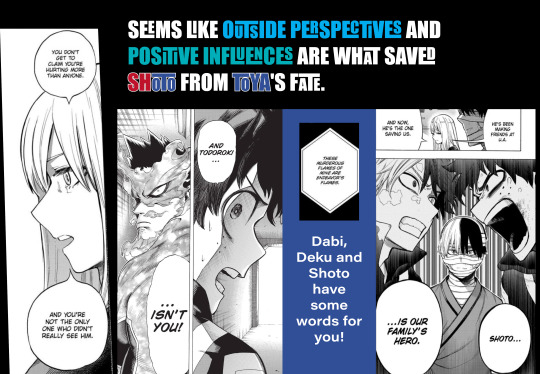
If Hawks told Dabi to his stapled face his real reasons for helping Endeavor, what would Dabi say? Heh heh heh. Dabi learned not to trust Rei, Fuyumi, or his own brother Natsuo, so I’m not terribly surprised he never trusted Keigo in the first place.
Keigo, who never thought to watch Dabi. Keigo, who had to ask who Dabi is. Keigo, who also didn’t see him.
Keigo, who wants to take Toya’s place.
But let’s talk about Toya’s other siblings... in part 2!
#todoroki family#bnha meta#bnha manga spoilers#dabi#toya todoroki#enji todoroki#endeavor#shoto todoroki#shoto#rei todoroki#fuyumi todoroki#natsuo todoroki#hawks#keigo takami#todoroki presentation
357 notes
·
View notes
Text
Flufftober Day 20
Snap
"Don’t look at me, I just know stuff.”
“OH!” Logan snaps his fingers and points at the TV. “He said it! Ice T said the line.”
Ugh. Wade rolls his eyes. He is SUCH an old person.
Wade could launch a diatribe on the depths of problematic that is the Law & Order franchise in general, and SVU in particular. With visuals and sources. But he holds his breath, because no amount of monologuing will dissuade Logan from picking it again the next time it’s his turn. The complete boomer.
Wait. He’s not a boomer. When he was born, he’d be what, like…Regency gen? Oh, Mr. Darcy.
After that thought is thoroughly unspooled, Wade searches around the room for another distraction from the infuriating drudge on the screen.
His eyes fall on Logan’s hand, which is draped loosely on the Rainbow Dash throw covering his lap. It’s so fuzzy, and veiny, and strong, and maybe it’s the couple of tokes Wade took with Al earlier but do you ever just think about how cool hands are?
He lets the pad of his thumb brush along the hairs on the back of Logan’s wrist and up the tendons and bones leading to his knuckles. There’s not a scar or bump giving away the T-Rex talons that could burst through the skin there at any moment.
“Hm.” The tiniest sound escapes the old man’s vocal cords, though his attention is still on the copaganda.
Wade offers just a little more pressure on his next pass over Logan’s meta carpals, eliciting a happy groan from deep in Logan’s chest.
“Does that feel good?” he questions.
Logan looks down at his hand, clenching his fist tight then spreading the fingers wide. The joints snap, crackle and pop like three elves just poured milk on them. He looks back at Wade with a cocked eyebrow. “What do you think, bub?”
Wade smiles and takes Logan’s hand in both of his. He gently massages it as Logan turns back to the TV. The old man grunts and sighs his approval, relaxing into the couch to take in the worst that Dick Wolfe has to offer.
Read all the Spideypool+friends drabbles here!
Prompt: Day 20 - Paw @flufftober
17 notes
·
View notes
Photo
I definitely phrased myself poorly here. I agree with you! But I also still think there's more to it. Alex does believe she can't help people in a courtroom... but she's still in a courtroom now in an attempt to help Jules Hunter that, according to her own words and the calm, confident way she lays out her strategy, she can't even classify as "desperate". Olivia's not entirely wrong here! There is an angle to helping people in a courtroom that it seems that Alex hasn't quite considered. Consciously, anyway - bc she still has her law license. She still keeps up with her legal contacts, judges, groups, etc. She still participates in the community. If not for this... then for what?
I feel like I tend to read Sunk Cost Fallacy at this point with regard to Olivia's wildly self-righteous reactivity to Alex as a thing she's doing to not look at herself and see the exact thing that Alex is pointing out. The entire episode is Alex holding up a mirror to Olivia and Olivia hating it, refusing to acknowledge it. If Alex were less strident about it - if Cabenson weren't characterized so much by the way they argue in general hahahaha - Olivia might have gotten closer to it. And I also agree with you about that - Olivia is absolutely missing the point, maybe even intentionally, and Alex is frustrated by it. But that frustration is inseparable from Olivia not being totally wrong in holding up the mirror here in return... or from the fact that it's Olivia who's holding the mirror, and that she's doing it bc it's Alex, because even in this quiet moment where they're on a date they're not fighting Olivia still can't help herself. That's the relationship. And that's a constant, even after all this time, even through all the ways they've found each other changed. It's so Olivia. It's so Alex. It's so predictable. And Alex has to laugh a little at it.



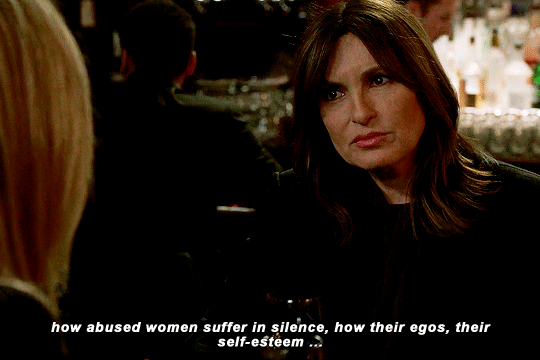


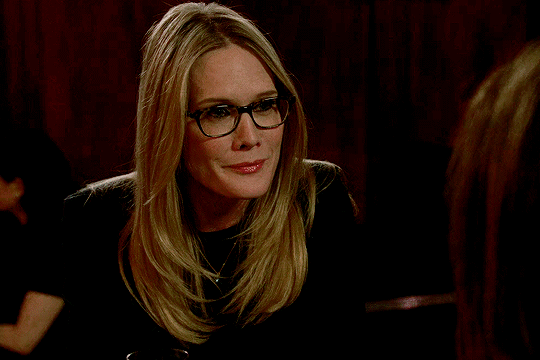
19x19 Sunk Cost Fallacy
305 notes
·
View notes